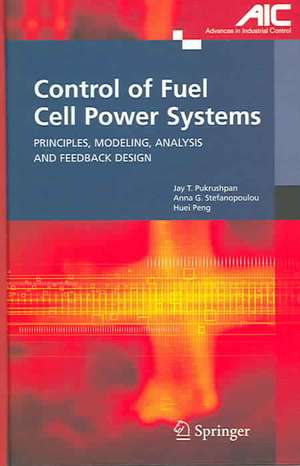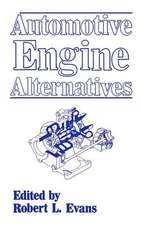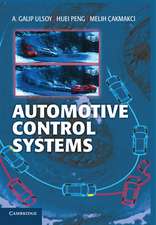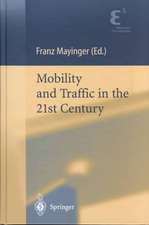Control of Fuel Cell Power Systems: Principles, Modeling, Analysis and Feedback Design: Advances in Industrial Control
Autor Jay T. Pukrushpan, Anna G. Stefanopoulou, Huei Pengen Limba Engleză Hardback – 29 sep 2004
| Toate formatele și edițiile | Preț | Express |
|---|---|---|
| Paperback (1) | 988.07 lei 6-8 săpt. | |
| SPRINGER LONDON – 21 oct 2010 | 988.07 lei 6-8 săpt. | |
| Hardback (1) | 992.64 lei 6-8 săpt. | |
| SPRINGER LONDON – 29 sep 2004 | 992.64 lei 6-8 săpt. |
Din seria Advances in Industrial Control
- 15%
 Preț: 643.34 lei
Preț: 643.34 lei - 23%
 Preț: 582.63 lei
Preț: 582.63 lei - 18%
 Preț: 783.98 lei
Preț: 783.98 lei - 18%
 Preț: 947.35 lei
Preț: 947.35 lei - 20%
 Preț: 568.24 lei
Preț: 568.24 lei - 15%
 Preț: 643.16 lei
Preț: 643.16 lei - 18%
 Preț: 899.21 lei
Preț: 899.21 lei - 18%
 Preț: 891.33 lei
Preț: 891.33 lei - 18%
 Preț: 740.57 lei
Preț: 740.57 lei - 18%
 Preț: 961.23 lei
Preț: 961.23 lei - 18%
 Preț: 955.08 lei
Preț: 955.08 lei - 15%
 Preț: 645.28 lei
Preț: 645.28 lei - 15%
 Preț: 638.43 lei
Preț: 638.43 lei - 18%
 Preț: 901.11 lei
Preț: 901.11 lei - 18%
 Preț: 1410.94 lei
Preț: 1410.94 lei - 18%
 Preț: 728.91 lei
Preț: 728.91 lei - 20%
 Preț: 1003.78 lei
Preț: 1003.78 lei - 18%
 Preț: 947.35 lei
Preț: 947.35 lei - 15%
 Preț: 643.34 lei
Preț: 643.34 lei - 15%
 Preț: 654.30 lei
Preț: 654.30 lei - 18%
 Preț: 950.52 lei
Preț: 950.52 lei - 15%
 Preț: 644.30 lei
Preț: 644.30 lei - 18%
 Preț: 1393.09 lei
Preț: 1393.09 lei - 18%
 Preț: 950.21 lei
Preț: 950.21 lei - 18%
 Preț: 949.90 lei
Preț: 949.90 lei - 18%
 Preț: 949.42 lei
Preț: 949.42 lei - 18%
 Preț: 950.52 lei
Preț: 950.52 lei - 18%
 Preț: 1113.71 lei
Preț: 1113.71 lei - 15%
 Preț: 650.04 lei
Preț: 650.04 lei - 15%
 Preț: 644.95 lei
Preț: 644.95 lei - 18%
 Preț: 950.33 lei
Preț: 950.33 lei - 18%
 Preț: 948.61 lei
Preț: 948.61 lei - 18%
 Preț: 1112.60 lei
Preț: 1112.60 lei - 15%
 Preț: 644.63 lei
Preț: 644.63 lei - 18%
 Preț: 953.20 lei
Preț: 953.20 lei - 18%
 Preț: 945.62 lei
Preț: 945.62 lei - 15%
 Preț: 640.88 lei
Preț: 640.88 lei - 15%
 Preț: 640.88 lei
Preț: 640.88 lei - 20%
 Preț: 650.92 lei
Preț: 650.92 lei - 18%
 Preț: 1112.60 lei
Preț: 1112.60 lei - 20%
 Preț: 998.36 lei
Preț: 998.36 lei - 15%
 Preț: 643.34 lei
Preț: 643.34 lei - 18%
 Preț: 948.92 lei
Preț: 948.92 lei - 18%
 Preț: 1381.43 lei
Preț: 1381.43 lei - 15%
 Preț: 651.51 lei
Preț: 651.51 lei - 15%
 Preț: 647.08 lei
Preț: 647.08 lei - 20%
 Preț: 563.66 lei
Preț: 563.66 lei - 18%
 Preț: 1225.79 lei
Preț: 1225.79 lei
Preț: 992.64 lei
Preț vechi: 1210.53 lei
-18% Nou
Puncte Express: 1489
Preț estimativ în valută:
189.93€ • 198.33$ • 156.85£
189.93€ • 198.33$ • 156.85£
Carte tipărită la comandă
Livrare economică 15-29 aprilie
Preluare comenzi: 021 569.72.76
Specificații
ISBN-13: 9781852338169
ISBN-10: 1852338164
Pagini: 184
Ilustrații: XVII, 161 p.
Dimensiuni: 155 x 235 x 16 mm
Greutate: 0.39 kg
Ediția:2004
Editura: SPRINGER LONDON
Colecția Springer
Seria Advances in Industrial Control
Locul publicării:London, United Kingdom
ISBN-10: 1852338164
Pagini: 184
Ilustrații: XVII, 161 p.
Dimensiuni: 155 x 235 x 16 mm
Greutate: 0.39 kg
Ediția:2004
Editura: SPRINGER LONDON
Colecția Springer
Seria Advances in Industrial Control
Locul publicării:London, United Kingdom
Public țintă
ResearchCuprins
1 Background and Introduction.- 2 Fuel Cell System Model: Auxiliary Components.- 3 Fuel Cell System Model: Fuel Cell Stack.- 4 Fuel Cell System Model: Analysis and Simulation.- 5 Air Flow Control for Fuel Cell Cathode Oxygen Reactant.- 6 Natural Gas Fuel Processor System Model.- 7 Control of Natural Gas Fuel Processor.- 8 Closing Remarks.- A Miscellaneous Equations, Tables, and Figures.- A.1 FCS Air Flow Control Design.- A.2 FPS Control Design.- References.
Notă biografică
Anna Stephanopoulou is becoming well-known among control engineers – she is now a regular on meeting program committees and as a session organizer for such leading conferences as American Control Conference and IFAC World Congress. She has also recently been appointed Associate Editor of the journal IEEE Control Systems Technology. She has previously been employed in the prestigious engineering faculty at UC Santa Barbara and at Ford Motor Company. She has received prizes for her work in automotive powertrain control, making her an ideal author for this type of monograph within the Advances in Industrial Control series.
Textul de pe ultima copertă
The problem of greenhouse gas (particularly carbon dioxide) release during power generation in fixed and mobile systems is widely acknowledged. Fuel cells are electrochemical devices offering clean and efficient energy production by the direct conversion of gaseous fuel into electricity. As such, they are under active study for commercial stationary power generation, residential applications and in transportation. The control of fuel cell systems under a variety of environmental conditions and over a wide operating range is a crucial factor in making them viable for extensive use in every-day technology.
In Control of Fuel Cell Power Systems the application of fuel cells in automotive powertrains is emphasized because of the significance of the contribution to global CO2 emissions made by ground vehicle propulsion and because of the challenge presented by the accompanying control problems. The authors’ comprehensive control-oriented approach provides:
• An overview of the underlying physical principles and the main control objectives and difficulties associated with the implementation of fuel cell systems.
• System-level dynamic models derived from the physical principles of the processes involved.
• Formulation, in-depth analysis and detailed control design for two critical control problems, namely, the control of the cathode oxygen supply for a high-pressure direct hydrogen fuel cell system and control of the anode hydrogen supply from a natural gas fuel processor system.
• Multivariable controllers that attenuate restraints resulting from lack of sensor fidelity or actuator authority.
• Real-time observers for stack variables that confer redundancy in fault detection processes.
• Examples of the assistance of control analysis in fuel cell redesign and performance improvement.
• Downloadable SIMULINK® model of a fuel cell for immediate usesupplemented by sample MATLAB® files with which to run it and reproduce some of the book plots.
Primarily intended for researchers and students with a control background looking to expand their knowledge of fuel cell technology, Control of Fuel Cell Power Systems will also appeal to practicing fuel cell engineers through the simplicity of its models and the application of control algorithms in concrete case studies. The thorough coverage of control design will be of benefit to scientists dealing with the electrochemical, materials and fluid-dynamic aspects of fuel cells.
Advances in Industrial Control aims to report and encourage the transfer of technology in control engineering. The rapid development of control technology has an impact on all areas of the control discipline. The series offers an opportunity for researchers to present an extended exposition of new work in all aspects of industrial control.
In Control of Fuel Cell Power Systems the application of fuel cells in automotive powertrains is emphasized because of the significance of the contribution to global CO2 emissions made by ground vehicle propulsion and because of the challenge presented by the accompanying control problems. The authors’ comprehensive control-oriented approach provides:
• An overview of the underlying physical principles and the main control objectives and difficulties associated with the implementation of fuel cell systems.
• System-level dynamic models derived from the physical principles of the processes involved.
• Formulation, in-depth analysis and detailed control design for two critical control problems, namely, the control of the cathode oxygen supply for a high-pressure direct hydrogen fuel cell system and control of the anode hydrogen supply from a natural gas fuel processor system.
• Multivariable controllers that attenuate restraints resulting from lack of sensor fidelity or actuator authority.
• Real-time observers for stack variables that confer redundancy in fault detection processes.
• Examples of the assistance of control analysis in fuel cell redesign and performance improvement.
• Downloadable SIMULINK® model of a fuel cell for immediate usesupplemented by sample MATLAB® files with which to run it and reproduce some of the book plots.
Primarily intended for researchers and students with a control background looking to expand their knowledge of fuel cell technology, Control of Fuel Cell Power Systems will also appeal to practicing fuel cell engineers through the simplicity of its models and the application of control algorithms in concrete case studies. The thorough coverage of control design will be of benefit to scientists dealing with the electrochemical, materials and fluid-dynamic aspects of fuel cells.
Advances in Industrial Control aims to report and encourage the transfer of technology in control engineering. The rapid development of control technology has an impact on all areas of the control discipline. The series offers an opportunity for researchers to present an extended exposition of new work in all aspects of industrial control.
Caracteristici
Shows the reader the latest research in the control of fuel cell technology, this will contribute to the commercial viability of the technology The authors’ background in automotive technology gives the work presented in this book added authority in a key sector in which fuel cell research is a vital part of future planning Includes supplementary material: sn.pub/extras














